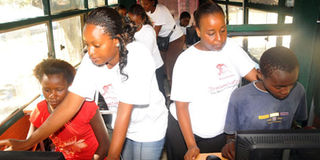Mombasa’s mobile computer classroom pulls in street children

PHOTO | FILE Street children get computer lessons in a Wema Centre bus in Mombasa.
A group of street children in Mombasa shriek with excitement and throw away their bottles of glue and sacks whenever they see the Wema Centre bus pull to a stop next to their dens at the Makadara grounds.
So important is the bus that the younger children beg the older ones for a chance to board it. From afar, one gets the impression that the bus has come to rescue the children from the miseries of life on the streets or to offer goodies. Not quite so.
The bus is a moving computer classroom and the young street boys and girls are excited about sitting in front of the machines.
Its interior has been converted into computer work stations. There are about 10 personnel inside with school syllabus textbooks and computer manuals.
As the batch of 10 children goes through computer lessons, the others queue outside to wait for their turn.
The project manager at Wema Centre, Mr Lloyd Muriuki, says that since the introduction of the project early this year, more than 150 street children have been attracted to education through the computers.
Next month, he says, the plan is to have the bus connected to the Internet through wireless network (Wi-Fi).
The project’s aim is to rehabilitate street children from age four to 14. The lessons are conducted every Monday, Wednesday, and Thursday. Usually, the bus stops at Makadara, Tononoka, and Mbaraki grounds, where street children like hanging out.
The children appear to be contented that Wema, as they popularly refer to their teachers, are offering them education in addition to computer studies free of charge, some of them claiming they are on the streets for lack of a means to attend school.
“The interest of these children towards learning is unbelievable to the extent that they drop their gum whenever they see us, just to be in class,” says Mr Josephat Mrutu, a Wema Centre project officer.
“I have never been to school but I have seen the importance of education through this programme,” says 13-year-old Moses Texas, who recently attended his fourth lesson in the bus.
Mr Muriuki says that even though Wema Centre plans to offer the lessons every working day, it has not been able to do so due to insufficient funds to fuel the bus and take care of other operational costs.
The students are taught basic knowledge in computer, English, mathematics, and other subjects in the primary school syllabus.
“The aim of this project is to help realise the dreams of street children who have never gone to school or those who dropped out. We hope to remove them from the streets by the time the project ends,” Mr Muriuki explains.
He adds that learners who regularly attend sessions and pass their tests are afterwards integrated in regular schools and Wema Centre caters for their fees, uniform, and other learning needs.
“These children are progressing well with learning and are attending classes regularly. Some of them are very bright,” says Ms Doreen Wanika, a social worker at Wema Centre.
However, there are challenges. “Sometimes the children come to class high on bhang. Some are rebellious and it becomes difficult when the older ones demand money to allow us to teach the younger ones,” Ms Wanika explains.
The e-learning project, which was initiated at the beginning of the year, is supported by several organisations.
The Technical University of Mombasa provides volunteer social workers to teach the children. The funds for the purchase of the computers were given by the Nairobi Stock Exchange and Stars Foundation, while the fabrication and modification of the bus was sponsored by Reliance Company Limited. Save The Children, an NGO, offers transport and food allowances to the volunteer staff.
The pilot phase of the project will run for six months up to June, after which it will enter its first phase for three years. Wema Centre targets at least 200,000 street children in this phase.
The organisation was started in a small home in Likoni in 1993 to rehabilitate street children. The initial home had six street girls.
Over time, Wema Centre has expanded from being a home to an organisation that executes outreach programmes, the e-learning for street children being one of them.




